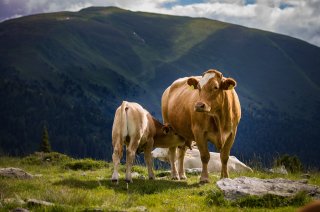 Ilona Ilyés from Pixabay" fetchpriority="AUTO">
Ilona Ilyés from Pixabay" fetchpriority="AUTO">
MACSUR Science-Policy Knowledge Forum
The MACSUR SciPol KF is a pilot exercise initiated by the Joint Programming Initiative for Agriculture, Food Security and Climate Change (FACCE-JPI) to bring science and policy actors together for the strategic design of responses to climate change adaptation and mitigation challenges in the agri-food sector in Europe. By synthesising model-generated knowledge, the hub will aim to provide evidence-based policy support for achieving carbon neutrality by 2050, adapting to climate change and understanding synergies and trade-offs in achieving these targets. More generally, the pilot will provide key lessons for the effective design and operation of science-policy interfaces.
The Kick-Off event-Open Panel Discussion “Role of science policy knowledge hubs in addressing the policy challenges of agriculture in the context of climate change in Europe” will take place June 22, 09:30-11:00 CET. Read the invitation.
Objectives
Beginning in June 2021, the MACSUR SciPol KF pilot will run for 18 months as a follow up to MACSUR 1 and 2 (https://macsur.eu/). It will initially address key policy questions from eight participating countries with the longer-term aim of expanding to address further policy needs and transnational initiatives. The key policy questions are connected to the 70% emission reduction targets for 2030 and carbon neutrality by 2050 under the European Green Deal and the Paris Agreement on limiting global warming as well as to the core themes of the FACCE-JPI Strategic Research Agenda. These policy questions are categorised into Mitigation, Adaptation, and Impacts. Mitigation topics address emission reduction strategies linked with livestock, cropping and aquaculture systems, carbon sequestration, consumer preferences, and conflicting land demands. Adaptation topics address agricultural and consumer measures to adjust to the effects of different climatic conditions. Topics associated with the Impacts focus on assessing ecosystem services and biodiversity, human and animal health, rural development, equity and the global footprint, spill over and rebound effects on food and nutrition security.
Transdisciplinary approach
The MACSUR SciPol KF pilot is adopting a transdisciplinary co-design process with a coordinated network of scientists and policy makers and a deep engagement of stakeholders from farming, civil society, and business. The results from modelling assessments will be discussed in participatory multi-stakeholder dialogues to ensure that research findings become increasingly relevant and sensitive to policy priorities.
Outcomes
The core output of the MACSUR SciPol KF will be established procedures for how researchers can best respond to policy questions that will have proven effective in exemplary cases related to mitigation and adaptation measures, their impact, synergies, and trade-offs.
Coordination
Leibniz Centre for Agricultural Landscape Research, Germany
Partners
Federal Research Institute for Rural Areas, Forestry and Fisheries, Germany; Aarhus University, Denmark; Institute of Agricultural Economics, Hungary; The Irish Agriculture and Food Development Authority, (Teagasc), Ireland; University of Florence, Italy; University of Birmingham, UK; Queens University Belfast, UK; Stichting Wageningen Research, Netherlands; University of Natural Resources and Life Sciences, Austria.
Collaborators
Institute for Rural and Regional Research, Norway; Agricultural Research And Development Station, Romania; Facultad de Ciencias Agropecuarias, Universidad Nacional de Córdoba Argentina, French National Research Institute for Agriculture, Food and Environment, France; Austrian Institute of Economic Research, Austria..